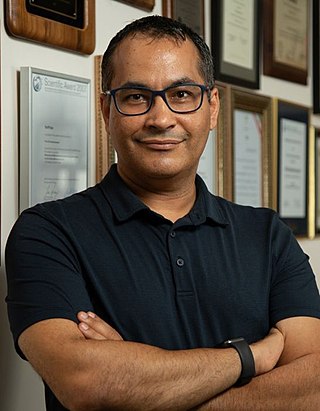
Ali Khademhosseini is the CEO of the Terasaki Institute, non-profit research organization in Los Angeles, and Omeat Inc., a cultivated-meat startup. Before taking his current CEO roles, he spent on year at Amazon Inc. Prior to that he was the Levi Knight chair and professor at the University of California-Los Angeles where he held a multi-departmental professorship in Bioengineering, Radiology, Chemical, and Biomolecular Engineering as well as the Director of Center for Minimally Invasive Therapeutics (C-MIT). From 2005 to 2017, he was a professor at Harvard Medical School, and the Wyss Institute for Biologically Inspired Engineering.
Kristi S. Anseth is the Tisone Distinguished Professor of Chemical and Biological Engineering, an Associate Professor of Surgery, and a Howard Hughes Medical Investigator at the University of Colorado at Boulder. Her main research interests are the design of synthetic biomaterials using hydrogels, tissue engineering, and regenerative medicine.
The A. A. Griffith Medal and Prize was awarded annually from 1965 to 2021 by the Institute of Materials, Minerals and Mining in commemoration of Alan Arnold Griffith.
Serena Michelle Best, is a British academic, and the Professor of Materials Science at the University of Cambridge.
Rylie Green is an Australian biomedical engineer who is a Professor at Imperial College London. She works on bioactive conducting polymers for applications in medical electronics.

Judith Louise MacManus-Driscoll is a Professor of Materials Science at the University of Cambridge. Driscoll is known for her interdisciplinary work on thin film engineering. She has a particular focus on functional oxide systems, demonstrating new ways to engineer thin films to meet the required applications performance. She has worked extensively in the fields of high temperature superconductors, ferroics and multiferroics, ionics, and semiconductors. She holds several licensed patents.
Ruth Cameron FInstP FIOM3 is a British materials scientist and professor at the University of Cambridge. She is co-director of the Cambridge Centre for Medical Materials. She studies materials that interact therapeutically with the body.
Eleanor Phoebe Jane Stride is a Professor of Biomaterials at St Catherine's College, Oxford. Stride engineers drug delivery systems using carefully designed microbubbles and studies how they can be used in diagnostics.
Alison Jean Davenport is the Professor of Corrosion Science at the School of Metallurgy and Materials, University of Birmingham.

The Department of Materials is responsible for the teaching and research in materials science and engineering at Imperial College London, occupying the Royal School of Mines and Bessemer buildings on the South Kensington campus. It can trace its origins back to the metallurgy department of the Government School of Mines and Science applied to the Arts, founded in 1851.

Joyce Y. Wong is an American engineer who is Professor of Biomedical Engineering and Materials Science and Engineering at Boston University. Her research develops novel biomaterials for the early detection treatment of disease. Wong is the Inaugural Director of the Provost's Initiative to promote gender equality and inclusion in STEM at all levels: Advance, Recruit, Retain and Organize Women in STEM. She is a Fellow of the American Association for the Advancement of Science, American Institute for Medical and Biological Engineering and Biomedical Engineering Society.
Allan Matthews (1952) is professor of surface engineering and tribology at the University of Manchester and director of the Digitalised Surfaces Manufacturing Network.
Sarah Harriet Cartmell is a British biomaterials scientist and Professor of Bioengineering at the University of Manchester. She specializes on the potential use of electrical regimes to influence cellular activity for orthopaedic tissue engineering applications.
Julie Elizabeth Gough is a Professor of Biomaterials and Tissue Engineering at The University of Manchester. She specializes on controlling cellular responses at the cell-biomaterial interface by engineering defined surfaces for mechanically sensitive connective tissues.
Ipsita Roy is a British-Indian materials scientist who is a professor at the University of Sheffield. Her research considers natural polymers of bacterial origin for medical applications. She was elected to the New York Academy of Sciences in 1997 and serves as the Editor of the Journal of Chemical Technology & Biotechnology.
Jeffrey Alan Hubbell is an American molecular engineer. During his early career, Hubbell founded three companies based on his academic research and was the holder of 88 U.S. patents.

Susan Andrea Bernal López is a Colombian materials scientist who is Professor of Structural Materials at the University of Leeds. Her research considers design, development and characterisation of novel cements. She was awarded the 2020 Institute of Materials, Minerals and Mining Rosenhain Medal and Prize.
Michelle Lynn Oyen is an American materials scientist who is a Professor of Biomedical Engineering at Washington University in St. Louis. Her research considers nano indentation and biomimetic materials.
Tatiana Segura is an American biomedical engineer who is a professor at Duke University. Her research considers biomedical engineering solutions to promote cell growth. She was elected Fellow of the American Institute for Medical and Biological Engineering in 2017 and awarded the Acta Biomaterialia Silver Medal in 2021.

Sohini Kar-Narayan is a British–Indian materials scientist who is a professor at the University of Cambridge. Her research considers polymer based materials for energy harvesting. She was awarded the 2023 Royal Society of Chemistry Peter Day Prize.






